Helping people keep up to date webinar
Transcript from the "Helping people keep up to date: Horizon scanning, alerting services, policy briefings" webinar, 12th December 2017
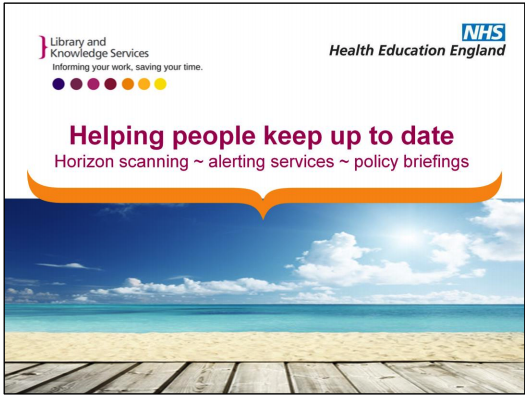
Welcome and thank you for joining and thank you to Alison
I’ve been invited to present this webinar because I chaired the KfH Current Awareness Task and Finish Group
As you know, this series of webinars has been structured to reflect the themes, tools and techniques in the KfH knowledge management toolkit. ‘Helping people keep up to date’ is one of these themes – I’ll explain how it fits – but I think it is fair to say that this area does differ from some of the others in toolkit in that ‘helping people keep up to date’ is already widely recognised as a core and traditional part of library service offer. Librarians are already doing it and have lots of experience.
In other areas of knowledge management – peer assist, knowledge harvesting, knowledge assets etc- the challenge is perhaps: no one else is doing this systematically, librarians can! The challenge here is maybe: most librarians do this, many others try to do it too, how can we work smarter and do it even better?
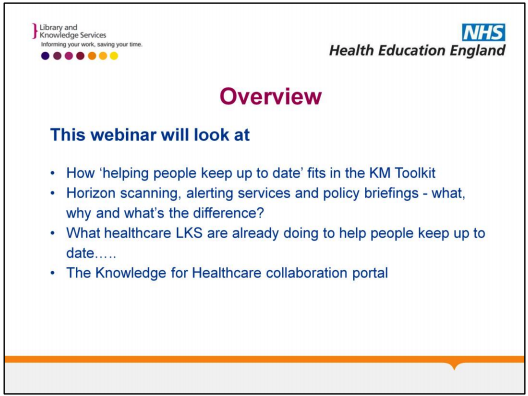
This is what I plan to cover. Hopefully this matches your expectations. It will take less than an hour. There will be two slots when we ask for your participation.
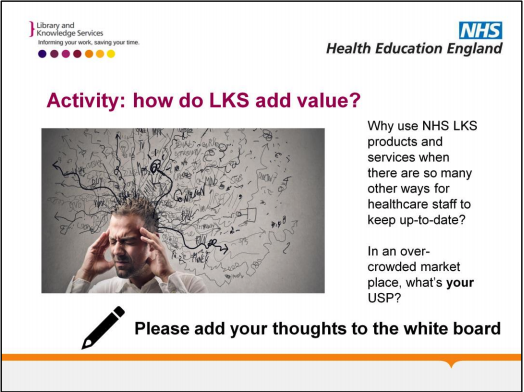
This is the first! I feel this guy’s pain, as I am sure do all of you. Information overload.
There are many, many ways for staff working in health and care to keep up to date – every organisation will be offering them personalised updates – their employer, their professional association or royal college, their professional network, their peers via social media, etc, etc, etc.
Think about your customers. What is your USP? What is your stand out offer or special twist?
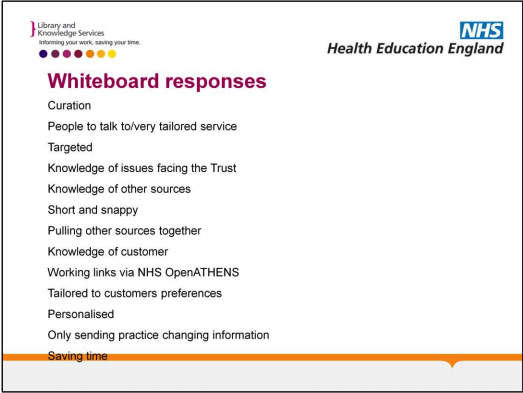
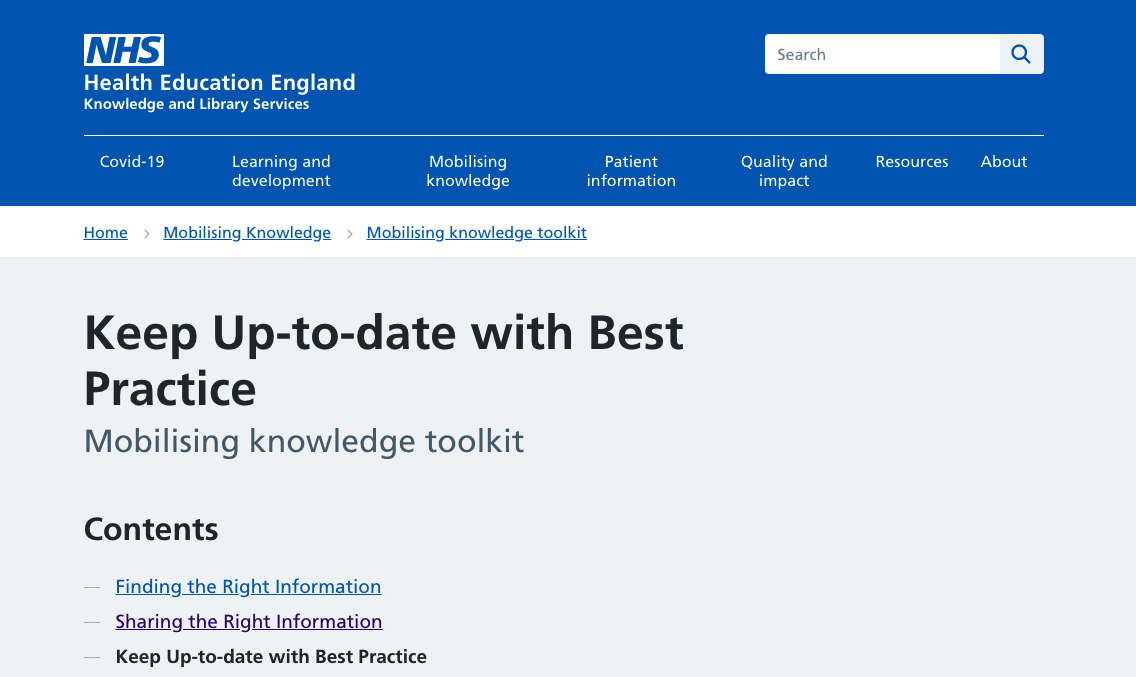
If you have joined other webinars in this series, you will be familiar with the contents of the KfH KM toolkit.
As a reminder, this is what the front page of the toolkit looks like, those are the themes. Under Helping People Keep up to date, there are three key activities. The toolkit offers definitions and provides examples….. So in order…..
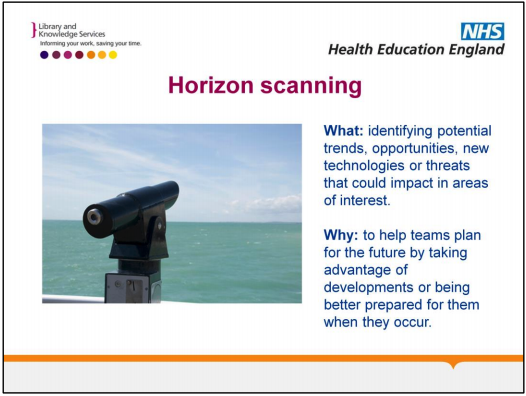
Horizon scanning is serious business – many organisations employ strategists, some employ futurists. This is the definition included in the toolkit:
Several organisations in the health sector produce alerts focussed on new and emerging trends. So for instance:
- The Specialist Pharmacy Service (part of NHS England) produces a new medicines newsletter
- The NIHR ‘innovations observatory’ has horizon scanning service and produces briefings
- NHS Employers has a horizon scanning section on its website, highlighting upcoming events, consultations, etc
Several health libraries produce ‘horizon scanning’ bulletins on forward-focussed topics.
- A health library collaborative in the North West produces Horizon scanning bulletins which aim to ‘support the commissioning process and service redesign, bringing together new and emerging information on range of topics’
- In the South, Oxford Health LKS produces bulletins for primary care entitled ‘Reshaping Clinical Care in General Practice’ and ‘Future-Proofing General Practice’
The clue to the fact they are future focussed is in the name and in the underpinning search strategies that the libraries use. Some library-produced bulletins are called ‘horizon-scanning bulletins’ but aren’t particularly future focussed.
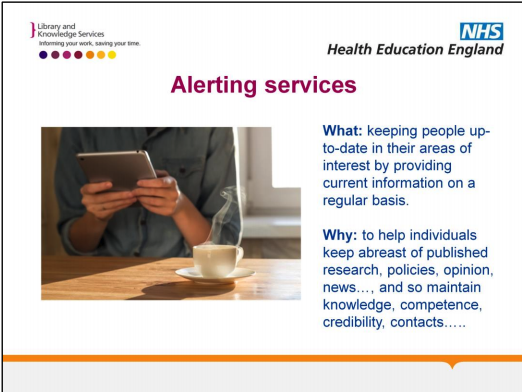
This is the second activity defined in the toolkit. Most of you will immediately recognise this as something you are already doing, a ‘bread and butter’ part of your service.
As per the white board activity you’ll have thought hard about why you are doing it, what exactly your customers want be alerted on – is it published research, is it expert opinion, is it news, is it all of those?- and how precisely it helps them. We’ll return to alerting services.
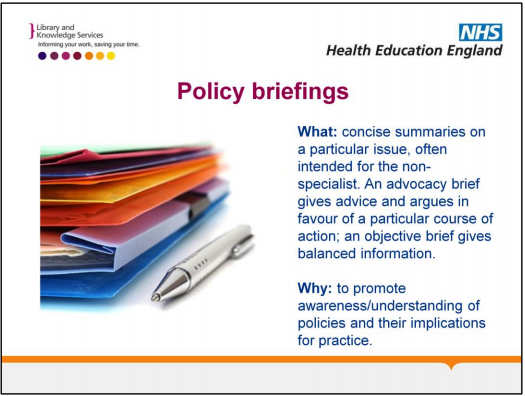
Third and final recognised activity in this area is policy briefings. Here is the toolkit definition.
What can we say about policy briefings?
Lots of organisations in health sector produce these e.g. NHS Employers, Health Foundation, Nuffield Trust, Kings Fund (short read and long read formats), NHS Clinical Commissioners (especially targeted at non-executive directors and lay members – as per the definition, briefings aim to help non-specialists understand complicated policy documents).
The JET Library at Mid Cheshire Hospitals NHS Foundation Trust produces policy briefings for healthcare professionals, these get included in the Map (Making Alignment a Priority) Library website, which additionally highlights the each policies implications/opportunities for library staff. I’m not aware of other NHS libraries producing policy briefings – but am happy to be corrected. It is a crowded space – other organisations doing it – but synthesising/summarising and communicating in plain English is a key librarian skill…..
Google for guidance on how to write briefings e.g. from UK Parliament and charity websites – consider audience, structure, use plain English, encourage action
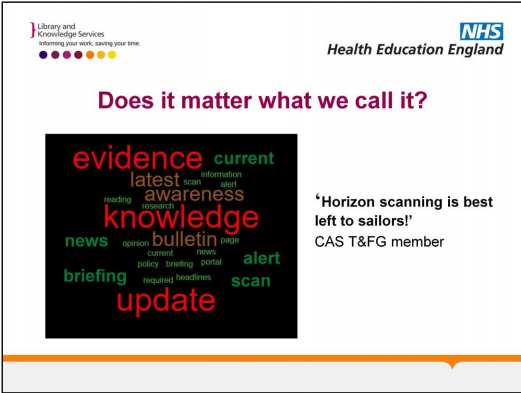
The KM toolkit presents horizon scanning, alerting services and policy briefings as separate activities with distinct purposes.
In practice they overlap. Maybe because we are being sloppy in our use of terminology, maybe because it is helpful for healthcare staff to see forward-focussed thought pieces, latest research and policy briefings within same product.
I think I have got this far through the webinar without saying current awareness services – but that is of course that is the term we use to encompass all of the above.
Public Health England librarians (I think there are some PHE on the webinar) have done work on definitions of knowledge products, looking at origins of terms like current awareness and Selective Dissemination of Information or SDI, noting also popularity of new names e.g. evidence update, knowledge update. PHE are sticking with current awareness service as name of their product, on basis that the term is understood by users – and identify 3 levels of service: TOCs, bulletins content pulled and pasted with minimum editing by librarians, and bulletins with content hand selected by librarians for relevance.
The CAS TaF members spent a lot of time debating definitions. On the right is a quote from one of the grumpy/exasperated ones. The group agreed that what is most important is that the name of your product or service is both meaningful and 9 eye-catching for your audience, and that you say something about scope and purpose.
We also agreed that what we needed to focus on were updating services involving knowledge specialist skills…..
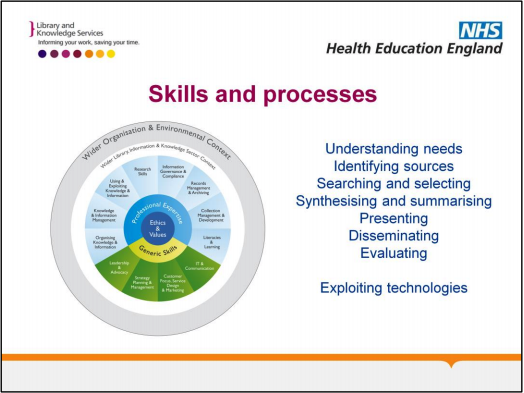
And on that, a slide which doesn’t tell you anything you don’t already know, but highlights that a whole range of skills is involved in process of producing and disseminating CA products and services, not least exploiting technology to pull content and push out results.
CILIP Professional Skills and Knowledge Base wheel on left
Its because it involves all these skills that librarians like doing it – keeps close to users and their interests – tangible product. Horizon scanning, alerting services and policy briefings require different combinations of skills
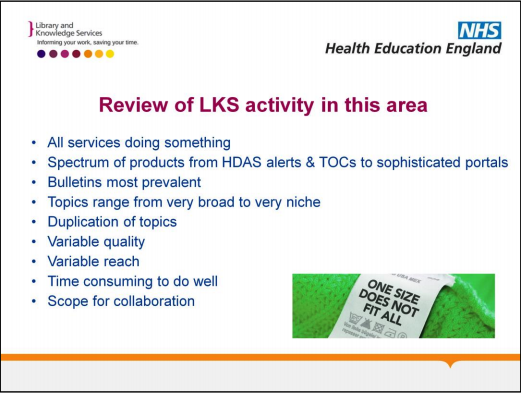
In 2016, the KfH CAS TaF Group surveyed all NHS library services in England about current awareness activity, 67% responded.
Here are headlines:
- Everyone doing something – sending out HDAS alerts or TOCs to maintaining portals
- Thing most LKS doing is producing bulletins – on topics ranging from very broad to quite specific, tailored to departments
- On paper, lots of duplication – 23 bulletins on healthcare management, 20 on dementia, 12 on public health…..
- Good examples and really quite poor examples
- Some staff and teams getting bespoke products – others getting nothing
- Time consuming to do well – but LKS staff passionate about doing it
- No one size fits all
- But scope for collaboration – to improve quality, extend reach and reduce duplication (e.g. free up time for other KM activities!)
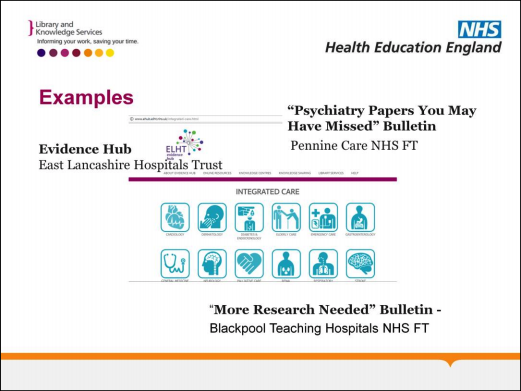
A few examples highlighted in KM Toolkit, with back story about why taken particular approach
East Lancashire Hospitals NHS Trust Evidence Hub -Graham Haldane
Concerns had been expressed through Deanery visits to Trust about use of Google and Wikipedia rather than more evidence-based resources. The library service had received feedback its current awareness services were too generic; they also wanted to increase awareness and usage of our online resources. The hub they have created includes 40 ‘Knowledge Centres’, structured by clinical Division and specialty, which provide tailored links to print and e-books, journals, ‘What’s new’ from UpToDate , national guidelines, professional organisations, web sites, apps and Twitter feeds.
“Psychiatry Papers you may have missed” bulletin - Lucy Anderson Pennine Care NHS Foundation Trust
Consultant Psychiatrists wanted to highlight research papers they had been reading and provide a commentary on good or controversial aspects – result is a monthly bulletin called’ including article details and abstract, link to the full text if available followed by a short paragraph beginning “Dr XXX says…” disseminated via the Trust intranet.
"More Research Needed” Bulletin - Laura Sims, Blackpool Teaching Hospitals NHS Foundation Trust
Challenge to library service to help inspire people to get involved in research. Created a monthly bulletin called ‘More Research Needed’ gather abstracts from recent studies which were inconclusive, and highlighted need for more research. Bulletin explains how important research is, and how to request a literature search as the first step to planning a research project.
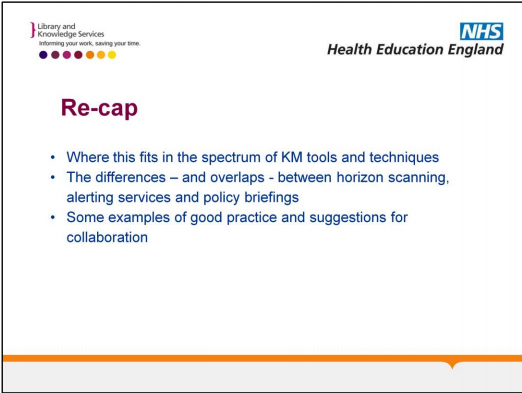
In this webinar we have considered
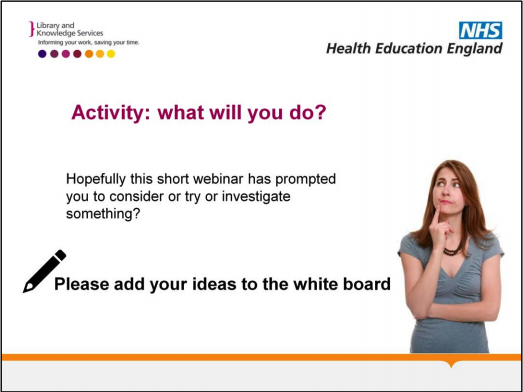
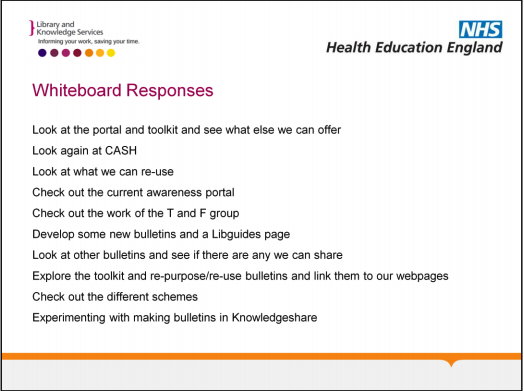
Page last reviewed: 16 June 2021